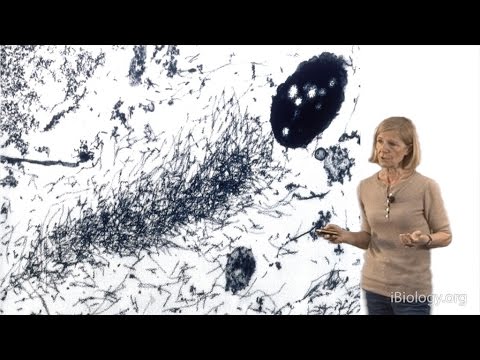Pascale Cossart (Institut Pasteur) Part 3: Cell biology and infection: lessons from Listeria
https://www.ibiology.org/microbiology/listeria/#part-3
Talk Overview:
Cossart begins her talk with an overview of microbiology and then focuses on the bacterium Listeria monocytogenes, a food-borne, intracellular pathogen. Cossart explains how Listeria enter epithelial cells, move around inside cells, and spread between cells. She describes how her lab identifed Listeria virulence genes by comparing the sequence of a non-pathogenic species of Listeria with the sequence of L. monocytogenes. They found that Listeria uses a wide variety of strategies to infect and proliferate within its host.
In Part 2, Cossart describes how modern molecular and cell biology techniques have yielded new concepts in microbiology. For example, small non-coding RNAs that are differentially expressed and necessary for virulence have been identified. Short and long antisense RNAs with multiple regulatory functions also have been found. It seems likely that these, and other newly identified mechanisms of bacterial regulation, may prove common to different bacterial species.
In her final talk, Cossart reviews the many cellular processes impacted during infection with Listeria. She successively discusses activation of clathrin-mediated endocytosis during bacterial entry, nucleation of actin comet-tails by bacterial ActA, post-translational modifications during infection (in particular deSUMOylation), mitochondrial targeting, and finally chromatin remodeling and epigenetic regulation during infection. Listeria is a true cell biologist, manipulating all aspects of cell function.
Speaker Biography:
Dr. Cossart is the Head of the Bacteria-Cell Interactions Group and a professor “Classe Exceptionelle” at the Pasteur Institute in Paris. She is also a Senior International Research Scholar of the Howard Hughes Medical Institute. Cossart completed her undergraduate studies at Lille University. She received an MS in Chemistry from Georgetown University and a PhD in Biochemistry from the Pasteur Institute and the University of Paris.
Cossart’s lab uses a multi-disciplined approach to study infection by intracellular bacteria. Listeria monocytogenes is their primary model system. Over the years, Listeria has provided numerous insights into the infection process from both the bacterial and cellular sides.
Cossart’s contributions have been recognized with many honors. She is a member of the French Académie des Sciences, the German Leopoldina, the National Academy of Sciences USA and a foreign member of the Royal Society, London. She won the L’Oreal/UNESCO Award for Women in Science 1998, the Richard Lounsbery Prize 1998, the Rober Koch Prize 2007, the Jeantet Prize 2008, and the Balzan Prize 2013. In 2014, Cossart was awarded the FEBS/EMBO Women in Science Award.
cisco academie



